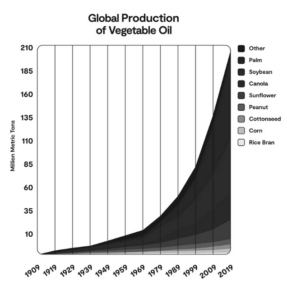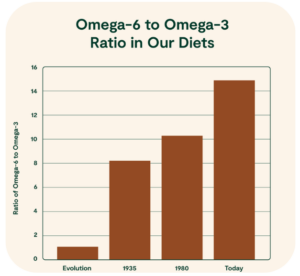Seed oils have become a massive part of so many modern diets, providing a source of fat, lubricant, calories, and, occasionally, nutrients for billions of people worldwide. Yet, behind their extreme ubiquity lies a complex web of environmental consequences and health concerns that are rarely discussed. With a growing movement of health experts linking seed oils to health issues like inflammation and obesity, it’s high time we look at not only their environmental costs but also whether their incredibly widespread use is really serving humanity at all.
What Exactly Are Seed Oils?
Seed oils are plant-derived oils extracted from seeds and fruits, such as soybeans, sunflowers, oil palms, and coconuts. These oils have become integral to most modern cooking, processed foods, and even industrial applications like biofuels and cosmetics. They’re mostly valued for their versatility and long shelf life.
However, the scale of seed oil production is staggering. Oil crops occupy approximately 37% of the world’s agricultural land, equating to 543 million hectares. This demand continues to grow, driven by an expanding global population and increased consumption of processed foods. By 2050, the production of vegetable oils is projected to rise by 14%, posing significant environmental and health challenges if current practices persist.
The Exponential Rise of Seed Oils in Our Diets
In the past century, seed oils have gone from being a negligible part of human diets to a dominant source of calories. This shift is largely driven by industrialization and the rise of processed foods, where seed oils are often used as cheap fillers or cooking agents. Today, seed oils like soybean, sunflower, and canola make up a significant portion of the fats consumed globally.
This exponential increase in seed oil consumption is troubling for several reasons. Emerging research suggests that the high levels of omega-6 fatty acids in many seed oils may contribute to an imbalance in omega-3 and omega-6 fatty acids which can contribute to chronic inflammation and in turn chronic diseases like heart disease, obesity, and diabetes. Additionally, the shift from traditional fats like butter and lard to seed oils coincides with rising obesity rates, raising questions about the long-term health impacts of these oils.
Given these concerns, the environmental degradation caused by seed oil production seems even harder to justify. Are we trading ecological damage for a product that might be doing more harm than good for human health?

The Environmental Footprint of Seed Oils
Deforestation and Habitat Loss
One of the most pressing issues with seed oil production is its contribution to deforestation. Tropical regions, in particular, are bearing the brunt of this expansion. Crops like oil palm and soybeans are often grown in areas cleared of rainforests or savannahs, leading to significant biodiversity loss. For example, the conversion of forests into palm oil plantations in Southeast Asia has devastated habitats for species like orangutans, tigers, and elephants.
The expansion of oil crops has also been linked to the destruction of grasslands and boreal ecosystems. This loss of natural vegetation not only reduces biodiversity but also disrupts carbon sequestration, exacerbating climate change.

Water Consumption
Seed oil production demands vast amounts of water. Among the major oils, olive oil has the highest water footprint at 14,500 cubic meters per ton, followed by linseed, groundnut, and sunflower oils. Even crops considered “efficient,” like palm oil, require substantial water resources, placing additional strain on freshwater supplies in vulnerable regions.
Carbon Emissions
Deforestation and land conversion for seed oil crops release significant amounts of greenhouse gases. Palm oil, despite its high yield, is a notable contributor to carbon emissions due to the clearing of carbon-rich peatlands in tropical regions. These emissions undermine global efforts to combat climate change and transition to a lower-carbon economy.
Soil Degradation
The monoculture farming systems prevalent in seed oil production often deplete soil health. The reliance on synthetic fertilizers and pesticides further degrades soil quality, reducing its ability to support diverse plant and animal life. Over time, this contributes to land degradation and desertification in some areas.
Why Does This Matter?
The environmental impacts of seed oil production are not isolated; they ripple across ecosystems and societies. As agricultural expansion continues, it threatens not only wildlife but also the livelihoods of communities dependent on healthy ecosystems. Moreover, the unsustainable practices tied to seed oils undermine global food security by degrading the very resources needed to sustain future generations.
When paired with health concerns, the case against seed oils becomes even stronger. If these oils contribute to inflammation, obesity, and other chronic diseases, then their widespread use may not be worth the environmental price we’re paying. A healthy humanity requires food systems that nourish both people and the planet.
Can Seed Oils Be Grown Sustainably?
Achieving sustainable seed oil production is possible, but it requires significant changes across the entire value chain. Here are some strategies that can help:
- Adopt Sustainable Farming Practices: Transitioning to regenerative agriculture and agroforestry can help mitigate the environmental impact of seed oil crops. These practices prioritize soil health, biodiversity, and water conservation. For example, intercropping – growing oil crops alongside other plants – can reduce monoculture risks and improve overall ecosystem resilience.

- Prevent Expansion Into Natural Ecosystems: Policies have to be created to restrain the expansion of oil crops into forests, savannahs, and other natural areas. Governments and industries should prioritize land-use planning that respects ecological boundaries and integrates sustainable development goals.
- Boost Yields on Existing Farmland: Smallholder farmers, who produce a significant share of the world’s food, often face challenges like low yields and limited resources. Investments in better farming techniques, access to modern tools, and education can help increase yields without requiring additional land.
- Rethink Non-Food Uses: Currently, about 28% of vegetable oils are diverted to non-food uses, including biofuels and animal feed. Redirecting these oils back to food production could alleviate the pressure to expand cropland. Additionally, reducing meat consumption and transitioning to alternative energy sources could lessen the demand for biofuels and feedstocks derived from oil crops.
- Develop Synthetic Oils and Alternatives: Synthetic oils, produced through microbial fermentation, offer a potential alternative to traditional seed oils. While these technologies are still in their infancy, finding good solutions and scaling them up could provide a sustainable solution to meet global demand without further depleting natural resources.
The Role of Consumers and Businesses
Sustainability is a shared responsibility that extends beyond farmers and policymakers to include consumers and businesses. Here’s how each group can contribute:
Consumers
- Choose sustainably certified products, such as those bearing labels like RSPO (Roundtable on Sustainable Palm Oil).
- Reduce overall oil consumption by minimizing food waste and opting for healthier cooking methods.
- Support brands that prioritize transparency and sustainability in their supply chains.
Businesses
- Commit to sustainable sourcing and ensure traceability throughout the supply chain.
- Invest in research and development for alternative oils and more efficient production methods.
- Collaborate with governments and NGOs to implement industry-wide sustainability standards.
Closing Thoughts
Seed oils have certainly become a heavily relied upon part of modern life, but their production and consumption come with significant environmental and health costs. From deforestation and biodiversity loss to rising concerns about inflammation and obesity, the widespread reliance on seed oils may not be serving humanity as well as we’ve been led to believe.
By adopting sustainable farming practices, preventing habitat destruction, and exploring innovative alternatives, we can reduce the environmental toll of seed oils. Consumers, businesses, and policymakers all have a role to play in shaping a future where the seed oils that we produce contribute to both human health and planetary well-being.
The next time you reach for a bottle of cooking oil, consider its journey – and its impact on the world. Together, we can make better choices that balance the needs of people and the planet.









